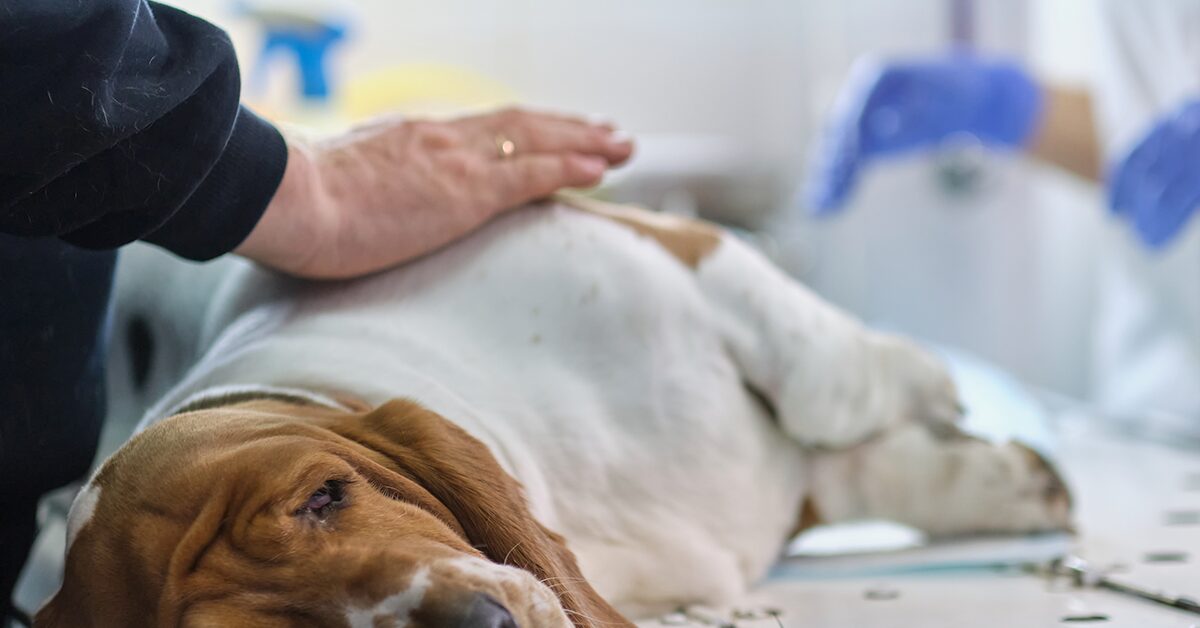As soon as the word, “pyometra” escapes your vet’s mouth, it might leave you worried, wondering what this infection is and if your sweet pup is going to be okay.
While it’s totally normal to feel worried, it’s important to have all of the facts. Let’s talk about what pyometra is, how to recognize it, and what you can do to prevent it.
Why does pyometra happen?
The first and most obvious question is: what is pyometra? Put simply, it’s a uterine bacterial infection that affects female dogs who have gone through several heat cycles without pregnancy. If your precious pooch is spayed, she won’t face a risk of pyometra as it only affects unspayed females.
The uterine wall’s lining thickens while a dog is in heat. Over time, if the dog doesn’t become pregnant during heat, this lining becomes thicker and thicker. Cysts may form in the uterine lining, creating an environment where infections can easily occur.
At the same time, high progesterone levels make it difficult for the uterine walls to contract. This prevents the uterus from closing and expelling bacteria. Progesterone-based drugs can also cause these complications, even if they’re used to prevent dogs from entering heat. Combined, these factors can lead to a uterine infection.
Another reason the uterus becomes susceptible to pyometra is that, during heat, the white blood cell count in the uterus decreases significantly. This is to prevent sperm that enters the uterus from being attacked. It’s a strong mechanism for increasing fertility, but a huge risk factor for dogs who aren’t getting pregnant.
Pyometra may affect young or middle-aged dogs, but it’s most common in older female dogs. It commonly occurs two weeks to two months after their last heat cycle.
What are the signs of pyometra?
If you suspect your dog is suffering from pyometra, some symptoms to look out for are:
- Vaginal discharge (you may notice this directly, or you might notice a discharge left behind where your dog has been sitting)
- Listlessness
- Fatigue
- Loss of appetite
- Anorexia
- Changes in thirst or urination
- Large or swollen abdomen
Note: Sometimes the cervix is shut, which prevents vaginal discharge – this is called “closed pyometra” different from “open pyometra” where the cervix is open.
If your female dog displays these abnormalities and hasn’t undergone an ovariohysterectomy, pyometra might be the cause. Owners of older dogs should be particularly aware of the risk.
What can be done to treat pyometra?
If you suspect your sweet pup has pyometra, you should bring them to the vet straight away. They will likely undergo x-rays and radiographs to help determine the state of the uterus. In the case of open pyometra, your vet may perform an ultrasound to indicate that it is in fact pyometra – and not pregnancy – that your dog is experiencing.
The most common medical treatment for pyometra is also the easiest way of preventing it – an ovariohysterectomy aka spaying.
How to prevent pyometra
It’s best to get your pup spayed before pyometra becomes a problem, as emergency surgery for an infected dog is more complicated than a routine spaying procedure. In particular, recovery times and prep times tend to be longer for emergency surgery, as vets want to be sure your dog is stable enough to withstand the anesthesia before putting them under. After surgery, your dog will be placed on an antibiotic regimen to ensure no infection remains.
In the case of dogs that contribute value to the breeding population, pyometra treatment may take a non-surgical form. Prostaglandins are hormones that, when injected into a dog, cause blood progesterone levels to decrease, thus, allowing the cervix to expel bacteria. However, the success rate for this non-surgical treatment is significantly lower than surgical treatments. Even if it’s successful, there can be serious side effects.
As a loving dog parent, you want to give your pup the best care possible should serious illnesses arise. Enrolling your pup in a pet insurance plan can help you do just that. Fetch a free quote from Pumpkin today!



